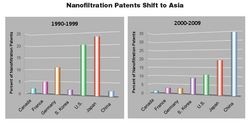Dec 10 2010
Water scarcity is driving a wave of innovation in water filtration technology from Asian nations, according to a report issued today by Chemical Abstracts Service (CAS), the world’s authority for chemical information.
The report, CAS Chemistry Research Report: Nanofiltration Shows Promise in the Quest for Pure Water, found that Asian researchers now lead the world in patent activity related to nanofiltration, the most-researched method of water filtration.
 Asian researchers now lead the world in patent activity related to nanofiltration, the most-researched method of water filtration
Asian researchers now lead the world in patent activity related to nanofiltration, the most-researched method of water filtration
According to the Asian Development Bank, Asian nations will face a 40 percent deficit between water supply and demand by 2030. Today’s report finds that in the quest to counter water scarcity, Asian researchers have issued 60 percent of all nanofiltration patents over the last 20 years, with China issuing 33 percent of all patents, followed by Japan and Korea, issuing 16 and 10 percent, respectively. Meanwhile, the United States led in the publication of scholarly research on nanofiltration, issuing 25 percent of all research journal literature between 1990 and 2009.
“Asian populations are growing exponentially faster than those of other countries making water shortages a looming issue,” said Christine McCue, vice president of marketing at CAS. “The CAS databases suggest that Asian researchers are focused intensively on mitigating this threat as they take a leadership position in the research and commercialization of nanofiltration technology, surpassing the U.S. and Western science output.”
Nanofiltration purifies water by forcing it through an ultra-fine membrane to remove contaminants such as salt, oil, pesticides and mercury. Nanofiltration systems are generally smaller and operate at lower pressures than reverse osmosis, making them more cost-effective and environmentally friendly.
"Nanofiltration leads to a considerable reduction in waste discharge, less energy consumption and improved raw materials utilization in our plants,” said Gerrald Bargeman, team leader of separation technology at AkzoNobel, which published more nanofiltration-related patent publications with the World Intellectual Property Organization (WIPO) than any other organization, according to the report.
Source: http://www.cas.org/